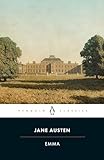

 My appetite for fiction comes and goes and recently it’s been hard to find. It’s no coincidence that during this period in which my bookmark has not moved from page 87 of Emma I’ve been feeling a little like Ishmael at the beginning of Moby-Dick, possessed of the urge to step into the street and begin knocking people’s top hats off. I have a hard time enjoying fictional characters when I’m feeling dreary towards the people who inhabit my real life. When I think about these recent months, and other times in my life when fiction has held less appeal, it occurs to me that a yen for fiction is something like my canary in the coal mine, an early indication, when it’s ebbs, that something else is wrong.
My appetite for fiction comes and goes and recently it’s been hard to find. It’s no coincidence that during this period in which my bookmark has not moved from page 87 of Emma I’ve been feeling a little like Ishmael at the beginning of Moby-Dick, possessed of the urge to step into the street and begin knocking people’s top hats off. I have a hard time enjoying fictional characters when I’m feeling dreary towards the people who inhabit my real life. When I think about these recent months, and other times in my life when fiction has held less appeal, it occurs to me that a yen for fiction is something like my canary in the coal mine, an early indication, when it’s ebbs, that something else is wrong.
Over dinner the other night I asked my wife Caroline to describe what moods, for her, correlate with a desire to read fiction. After a moment she said, “When I’m feeling stimulated, I like to read fiction, and when my life feels sterile, I don’t.” This rang true to me and I think it captures one of the essential paradoxes of fiction and art more generally: that to engage it requires a withdrawal from life, but to appreciate it requires a deep immersion in that very same thing.
I was feeling sterile last week on a night when I spent hours working at the very tedious task of formatting a long outline on the computer. It was the type of mind-numbing process we’re all familiar with, and by the end of it I felt like a very thin man with a very narrow outlook on the world. As I tried to fall asleep that night, I found that my whole life felt like one large unimaginative outline: Bullet points for the errands I needed to do the next day, bold 14-point headings for the things I hoped to accomplish over the next five years. In this limited state of mind, the idea of reading fiction was not just unappealing—it was completely incomprehensible—in the same way that aspiration must make very little sense to a cat.
All forms of desire have their natural enemies and I find that nothing saps my desire to read fiction like the Internet does. This is partly physiological—too much time at the computer withers my brain—but it’s partly dispositional, too. After the last round of primaries a couple Tuesdays ago, I spent an hour reading articles about the Tea Party. When I came up for air I was in an explicitly present-tense state of mind where anything written more than an hour ago seemed to be based on a world that had already been subsumed. Novels, which require a willingness to attend to more enduring themes, don’t hold up very well by this perspective.
Politics as a whole has a fairly degrading effect on my fiction drive. It’s not just that it’s depressing to watch the way Congress operates—it’s that it’s depressing in such an unredeemable way. Fiction can be depressing too, of course, but there’s something intrinsically optimistic about the process by which tragedy and frailty are turned into art.
There’s no similar silver lining when reform legislation gets gutted by special interests, (even writing the term “special interests” I can feel a requisite vigor drain from my body), or the country slides deeper into another foreign quagmire. One friend I talked to about this said that he had the opposite impulse, that he inclines towards fiction when he can’t bear to look at the world anymore. I get this, but I also think that the impulse to create fiction, and to read it, derives from a fundamentally hopeful place—in which life is interesting enough to write about and meaningful encounters remain possible. If it is ever known that the world is sliding irretrievably into ruin, I don’t think I’ll be reading a novel on the way down.
The more I’m engaged with life—and particularly with other people—the more I want to read fiction. At the peak of a wedding reception or in the throes of a night out when the crowd has given itself over to celebration, I often want to sneak off and read a novel. It’s a contradictory impulse, to want to retreat into a book at the precise moment I am most enthralled with life, but such are the circumstances we live by. What I’m after, I think, is a kind of synergy that can only happen when I approach a novel while my body is still charged with the feeling of being present and alive.
 At the same time, several of my most memorable encounters with fiction have taken place when I’ve been my most alone. In January 2008 I spent a month in Florence, South Carolina volunteering on a presidential campaign. The days were long and tiring, but it was exhilarating to feel like I was midstream in history. Late at night I’d return to the attic bedroom where I was staying in the home of a local resident and I’d read Anna Karenina until I couldn’t stay awake any longer. I’ve rarely had so clear a view of the outline of my own skin as I did then, reading about Anna’s fall and Lenin’s angst in a house where everyone else was asleep, in a town where I didn’t know anyone’s last name.<[1]
At the same time, several of my most memorable encounters with fiction have taken place when I’ve been my most alone. In January 2008 I spent a month in Florence, South Carolina volunteering on a presidential campaign. The days were long and tiring, but it was exhilarating to feel like I was midstream in history. Late at night I’d return to the attic bedroom where I was staying in the home of a local resident and I’d read Anna Karenina until I couldn’t stay awake any longer. I’ve rarely had so clear a view of the outline of my own skin as I did then, reading about Anna’s fall and Lenin’s angst in a house where everyone else was asleep, in a town where I didn’t know anyone’s last name.<[1]
During that same conversation a few nights ago Caroline said “When I have a lot of space in my life I want to read fiction.” Space, she continued, is not the same thing as emptiness, and it doesn’t take a mountaintop or a weekend with no plans to find it. By space I think she meant both a sense of where she is and an awareness of the contingency that sprawls around her. These are the eddies in our days where fiction takes hold, the quiet of our apartment after our son has gone to sleep, the afterglow of making love, when we know that we will be moving on, but not quite yet.
Back | 1. I realize this story might seem inconsistent with what I said above about politics having a degrading effect on my appetite for fiction. In this case I think the important distinction is between passively observing the problems with the world, and actively working in support of something I believed in. The latter disposition, wherever it strikes, is a good one for reading fiction, I think.
(Image: Human highway, image from pagedooley’s photostream)








